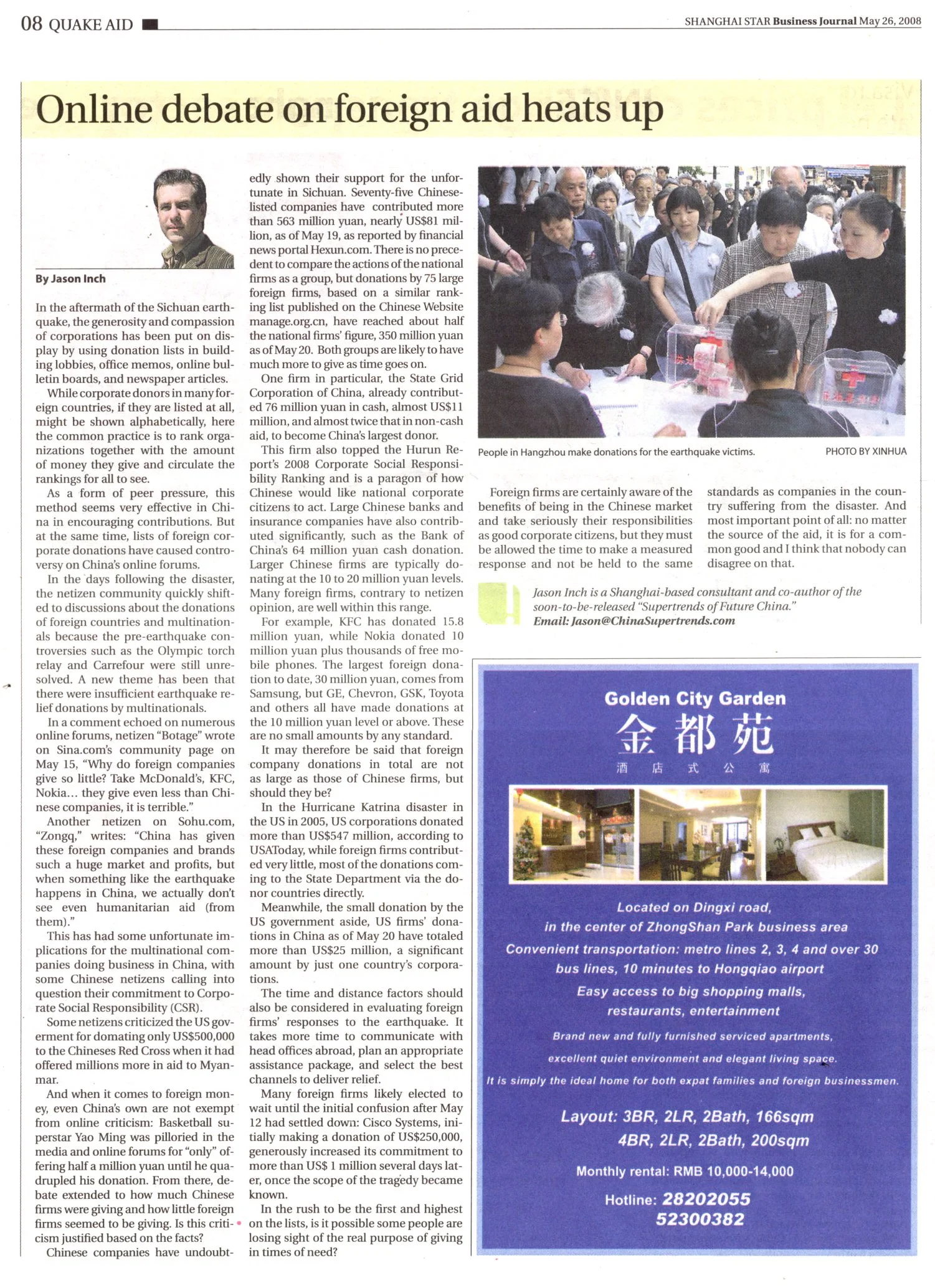Online debate on foreign aid heats up
In the aftermath of the 2008 Sichuan Earthquake, corporations’ generosity and compassion has been put on display in donation lists in building lobbies, office memos, online bulletin boards, and newspaper articles. While corporate donators in many foreign countries, if they are listed at all, might be shown alphabetically, here the common practice is to rank organizations together with the amount of money they give and circulate the rankings for all to see. As a form of peer pressure, this method seems very effective in China at encouraging contributions. But at the same time, lists of foreign corporate donations have caused controversy in China’s online forums.
In the days following the disaster, the Netizen community quickly shifted to discussions about the donations of foreign countries and multinationals because the pre-earthquake issues such as the Torch Relay and Carrefour were still unresolved. A new theme has been insufficient earthquake relief donations by multinationals.
In a comment echoing on numerous online forums, Netizen botage wrote on Sina.com’s community on May 15, “Why do foreign companies give so little? Take McDonald’s, KFC, Nokia… they give even less than Chinese companies, it is terrible.” Another Netizen on Sohu.com, zongq, writes, “China has given these foreign companies and brands such a huge market and profits, but when something like the earthquake happens in China, we actually don't see even humanitarian aid [from them].”
This has had some unfortunate implications for the multinational companies doing business in China with some Chinese Netizens calling into question their commitment to Corporate Social Responsibility (CSR).
The wave of criticism against insufficient donations started against the US government, for donating only US$500,000 to the Chinese Red Cross when it had offered millions more in aid to Myanmar. And when it comes to foreign money, even China’s own are not exempt from online excoriations: Basketball superstar Yao Ming was pilloried in the media and online forums for only offering half a million yuan until he quadrupled his donation. From there, debate extended to how much Chinese firms were giving and how little foreign firms seemed to be giving. Is this criticism justified based on the facts?
Chinese companies have undoubtedly shown their support for the earthquake-stricken in Sichuan. 75 Chinese-listed firms have so far contributed more than 563 million yuan, nearly US$110 million, as of May 19, as reported by financial news portal Hexun.com. There is no precedent to compare the actions of the national firms as a group, but donations by 75 large foreign firms, based on a similar ranking list published on Chinese website manage.org.cn, have reached about half the national firm’s figure, 350 million yuan as of May 20. Both groups likely have much more to give as time goes on.
One firm in particular, the State Grid Corporation of China, already contributed 76 million yuan in cash, almost US$11 million, and almost twice that in non-cash aid, to become China’s largest donator. This firm also topped the Hurun Report’s 2008 Corporate Social Responsibility Ranking and is a paragon of how Chinese would like national corporate citizens to act. Large Chinese banks and insurance companies have also contributed significantly, such as the Bank of China’s 64 million yuan cash donation. Larger Chinese firms are typically donating at the 10 to 20 million yuan levels. Many foreign firms, contrary to Netizen opinion, are well within this range.
For example, KFC has donated 15.8 million yuan, while Nokia donated 10 million yuan plus thousands of free mobile phones. The largest foreign donation to date, 30 million yuan, comes from Samsung, but GE, Chevron, GSK, Toyota and others all have made donations at the ten million yuan level or above. These are no small amounts by any standard.
It may therefore be said that foreign company donations in total are not as large as those of Chinese national firms, but should they be? In the Hurricane Katrina disaster in the US in 2005, US corporations donated more than US$ 547 million, according to USAToday, while foreign firms contributed very little, most of the donations coming to the State Department via the donor countries directly. Meanwhile, the small donation by the US government aside, US firms’ donations in China as of May 20 have totaled more than US$25 million, a significant amount from just one country’s corporations.
The time and distance factors should also be considered in evaluating foreign firms’ responses to the earthquake. It takes more time to communicate with head offices abroad, plan an appropriate assistance package, and select the best channels to deliver relief. Many foreign firms likely elected to wait until the initial confusion after May 12 had settled: Cisco Systems, initially making a donation of US$ 250 thousand, generously increased its commitment to more than US$ 1 million several days later once the scope of the tragedy become known.
In the rush to be the first and highest on the lists, is it possible some people are losing sight of the real purpose of giving in times of need? Foreign firms are certainly aware of the benefits of being in the Chinese market and take seriously their responsibilities as good corporate citizens, but they must be allowed the time to make a measured response and not be held to the same standards as companies in the country suffering from the disaster. And the most important point of all: No matter the source of the aid, it is for a common good and I think that nobody can disagree on that.
Republished from May 26, 2008
Jason Inch is a Shanghai-based consultant and co-author of the soon-to-be-released Supertrends of Future China. Email: Jason@ChinaSupertrends.com


